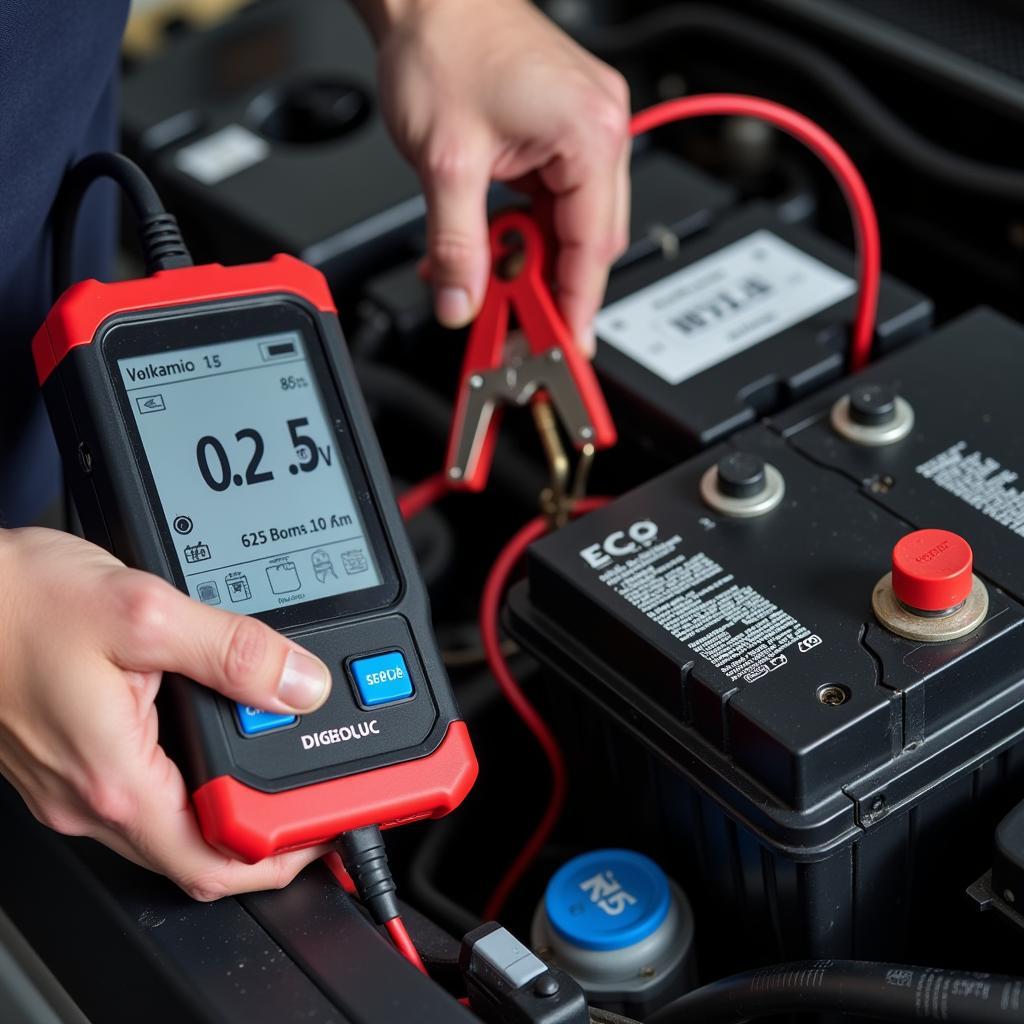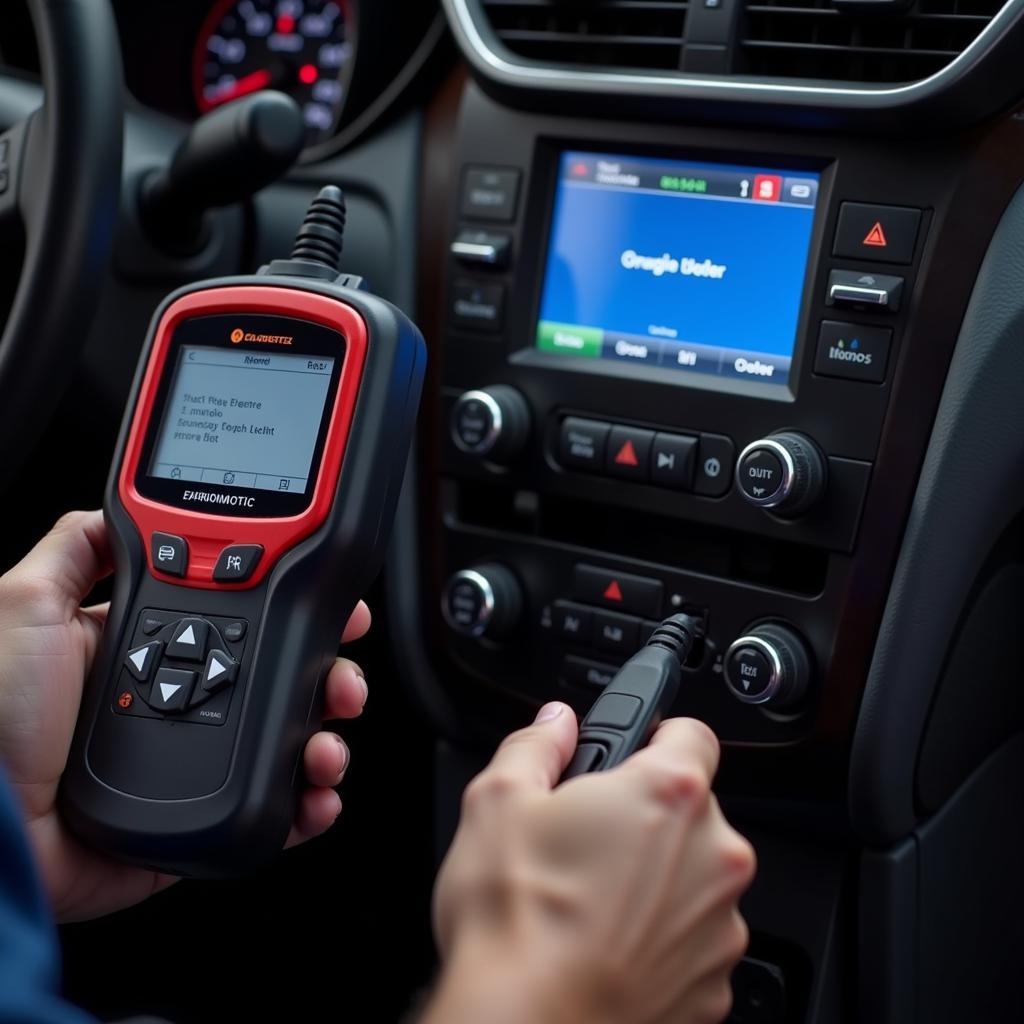When your car refuses to start, it can be a frustrating and perplexing experience. While jump-starting might seem like the go-to solution, understanding the root cause is crucial. This is where car diagnostics come into play, acting as a detective to pinpoint the culprit behind your car’s starting issues.
 Car Battery Diagnostic Test
Car Battery Diagnostic Test
Why Car Diagnostics are Essential After a No-Start
Car diagnostics involve plugging a specialized tool, a car diagnostic reader, into your vehicle’s OBD-II port. This reader acts as a communication bridge, extracting error codes and valuable data from your car’s computer. Think of these codes as your car’s way of signaling for help.
Deciphering these codes can reveal a range of problems, from a dying battery to a faulty fuel pump. Here’s why car diagnostics are non-negotiable after your car doesn’t start:
- Accurate Diagnosis: Instead of relying on guesswork, car diagnostics provide a precise diagnosis of the issue, saving you time and potential misdiagnosis costs.
- Targeted Repairs: By identifying the specific problem, you can ensure that only necessary repairs are carried out, preventing unnecessary replacements and saving you money.
- Preventative Maintenance: Diagnostics can also unveil underlying issues before they escalate into major problems, allowing for timely intervention and potentially preventing costly breakdowns in the future.
Common Reasons Your Car Won’t Start and How Diagnostics Help
Understanding the connection between common no-start causes and how diagnostics pinpoint them can empower you to address the situation effectively:
1. Battery Issues
Problem: A dead or weak battery is often the primary suspect when your car won’t start.
Diagnostic Insight: A car diagnostic reader basic price can immediately check your battery’s voltage, indicating its health and ability to hold a charge.
2. Starter Motor Failure
Problem: The starter motor is responsible for cranking the engine to life. A failing starter motor won’t be able to do its job.
Diagnostic Insight: While not all diagnostic tools can directly test the starter motor, they can reveal related faults within the starting circuit, providing valuable clues.
3. Alternator Malfunction
Problem: The alternator keeps your battery charged while driving. A faulty alternator won’t charge the battery, eventually leading to a no-start.
Diagnostic Insight: Diagnostics can monitor the alternator’s performance, detecting if it’s charging the battery properly.
4. Fuel System Problems
Problem: Issues with the fuel pump, fuel filter, or injectors can disrupt fuel delivery, preventing the engine from starting.
Diagnostic Insight: Diagnostic tools can assess fuel pressure and identify problems within the fuel system, narrowing down the culprit.
 Mechanic Using Diagnostic Scanner on a Car’s Engine
Mechanic Using Diagnostic Scanner on a Car’s Engine
5. Ignition System Faults
Problem: The ignition system ignites the air-fuel mixture in the engine cylinders. Faults in the spark plugs, ignition coils, or other components can prevent this process.
Diagnostic Insight: Diagnostics can identify misfires, ignition timing issues, and other ignition system problems.
Don’t Ignore the Check Engine Light
“John, a seasoned mechanic at our car diagnostics stoke workshop, often emphasizes, ‘The check engine light is not to be ignored, especially after a no-start. It’s your car’s way of communicating a problem, and diagnostics are the key to understanding its language.’”
The check engine light can illuminate for a multitude of reasons, some minor and some potentially serious. When your car doesn’t start, and this light is on, it often indicates a problem directly related to the no-start. Car diagnostics can retrieve the specific trouble code associated with the check engine light, providing a clear picture of the issue.
DIY vs. Professional Car Diagnostics: Making the Right Choice
While DIY car diagnostic tools are readily available, seeking professional help can be more beneficial:
- Advanced Equipment: Professional mechanics often have access to more advanced OBDII/EOBD car diagnostic tool that can perform comprehensive tests and access deeper vehicle data.
- Technical Expertise: Interpreting diagnostic codes and data accurately requires specialized knowledge and experience that professional mechanics possess.
- Complex Repairs: If the diagnostic results reveal complex issues that require specialized tools or in-depth mechanical knowledge, a professional will be better equipped to handle the repairs.
Car Diagnostics: Your First Line of Defense
In the world of modern vehicles, car diagnostics are no longer optional – they’re essential. When your car refuses to start, don’t be left stranded in a sea of uncertainty. Car diagnostics act as your guide, illuminating the path to a swift and efficient resolution. Whether you choose a DIY approach or seek professional help, remember that timely diagnostics can save you time, money, and future headaches.
FAQ: Car Diagnostics After Car Doesn’t Start
1. Can I drive my car if the check engine light is on after a no-start?
It’s best to avoid driving and consult a mechanic immediately. Driving with a potentially serious problem can cause further damage.
2. How much does car diagnostic testing cost?
Costs vary depending on the location and complexity of the issue. It’s best to contact local workshops for accurate pricing.
3. Can a diagnostic tool fix my car?
No, diagnostic tools only identify problems. They don’t perform repairs.
4. Are car diagnostics only necessary for newer cars?
Most cars manufactured after 1996 have an OBD-II port, making them compatible with diagnostic tools.
5. How often should I get my car diagnostics checked?
It’s a good practice to have your car diagnostics checked annually or whenever you notice unusual performance issues.
Need More Information?
- Explore our article on “diagnostic reset on car” to learn about resetting diagnostic codes after repairs.
- Discover the benefits of using a “delphi car diagnostic android” tool for mobile diagnostics.
If you require assistance with car diagnostics or need expert advice on your car troubles, don’t hesitate to reach out. Contact us via WhatsApp: +1(641)206-8880 or Email: [email protected]. Our dedicated team of car diagnostic specialists is available 24/7 to provide you with the support you need.

Leave a Reply